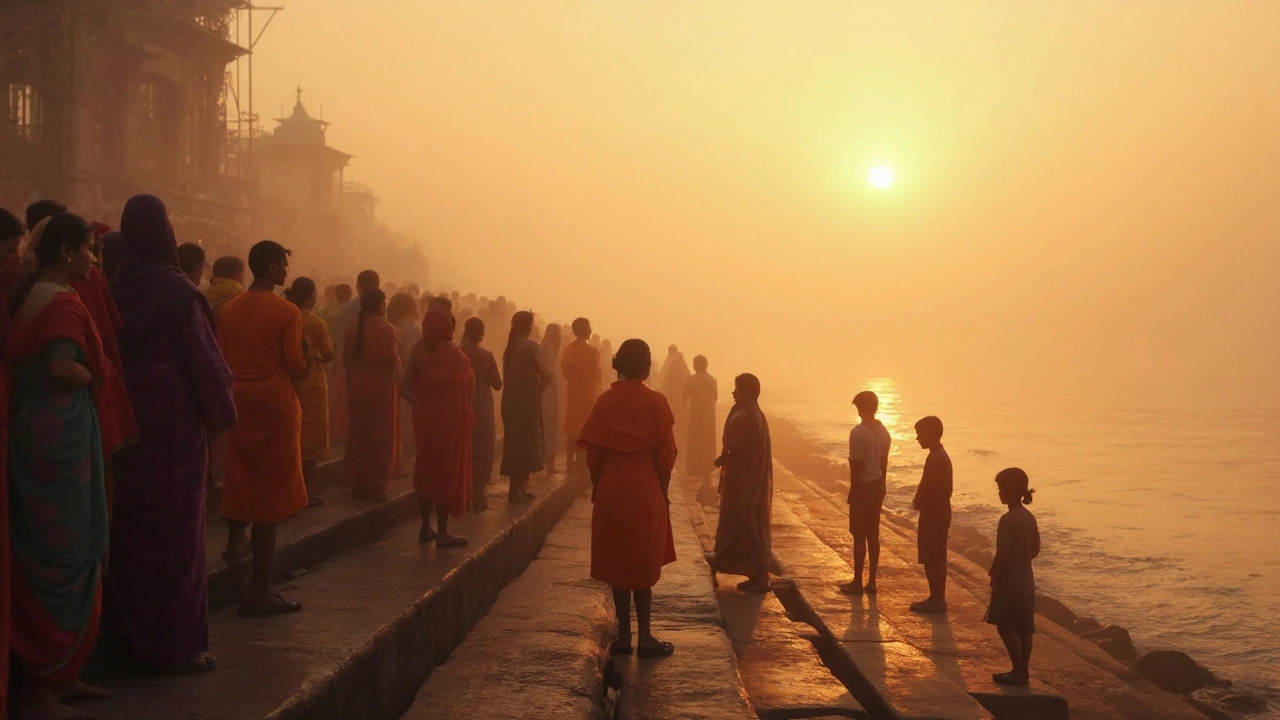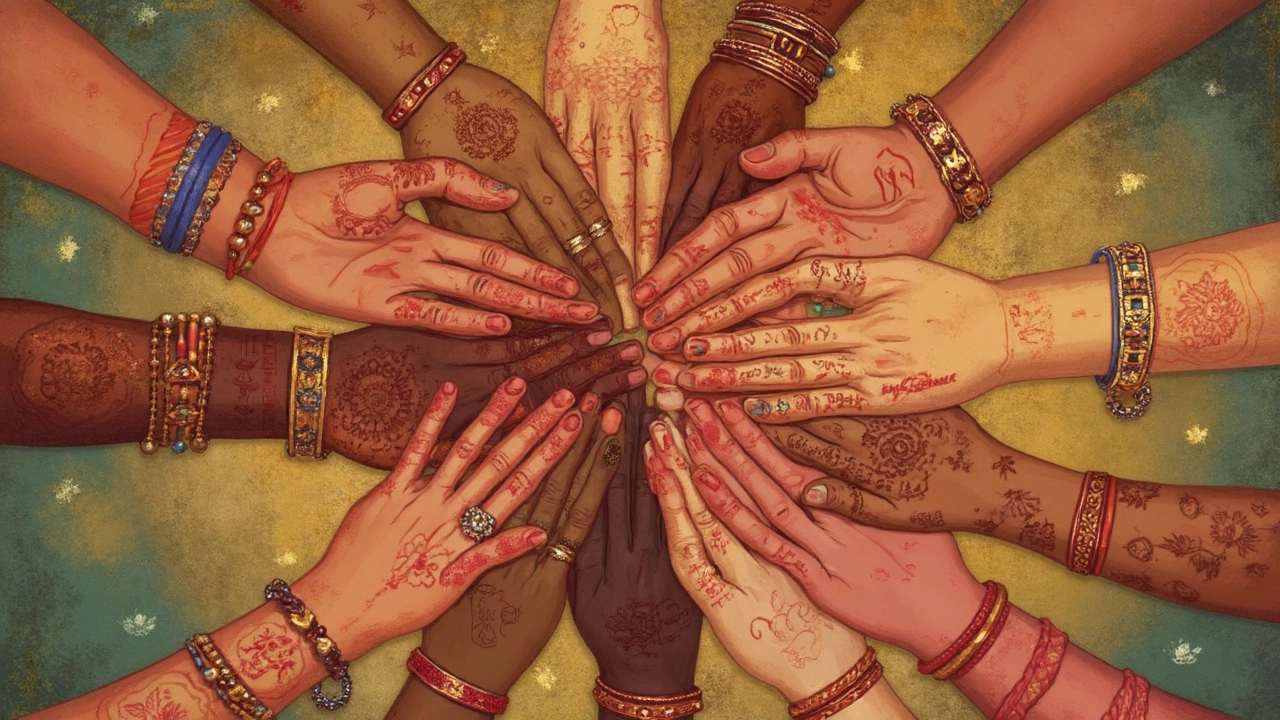Short Quotes on Oneness: Simple Insights from Indian Spirituality

Ever heard a short quote that just hits home? Indian spirituality is packed with simple lines about oneness that actually stick in your mind—and make you stop and think. You don’t need a library of ancient scriptures to pick up the idea. Sometimes, just one sentence gets the whole point across.
Think about how often we feel disconnected, whether it’s at work, at home, or even when scrolling online. That’s where these short quotes really come in handy. They’re like reminders you can carry in your pocket. People in India have been using them for centuries as a way to remember that at the end of the day, we’re not so different from each other.
Short oneness quotes aren’t just nice words—they can shift your mindset when you’re stressed or stuck in arguments. Imagine a heated moment at home, and you quietly remind yourself: “All are one.” Suddenly, things don’t feel so personal anymore. This is how a simple quote finds its way into real life.
- What Does Oneness Really Mean?
- Popular Short Quotes About Oneness
- Why Indian Spirituality Focuses on Unity
- Using Oneness Quotes in Everyday Life
- Tips for Deepening Your Own Sense of Unity
What Does Oneness Really Mean?
Let’s get straight to it. The word oneness isn’t some mystical idea you can’t grasp. In Indian spirituality, oneness means realizing that, deep down, there’s no real separation between people, nature, or even the universe itself. At its core, it’s about seeing the connection we share with everyone and everything around us. For example, ancient Indian texts like the Upanishads talk about ‘Tat Tvam Asi,’ which translates as ‘You are that.’ It’s a short quote, but it hits hard—basically saying the same force or soul sits inside all living things.
Instead of living life thinking “us versus them,” the idea is to see that, in some way, we all come from the same source—even if we look, speak, or think differently. Pretty practical, right? This mindset helps stop petty rivalries and gives more space for empathy. Here’s a good example: Mahatma Gandhi, who lived by these ideas, often said, “The best way to find yourself is to lose yourself in the service of others.” It’s a classic spiritual trick—when you’re focused on others, the lines between ‘me’ and ‘you’ blur.
If you look around at how people treat each other, it’s easy to see why unity and spirituality are a big deal in India. Temples, festivals, and even daily greetings like “Namaste” all nod to this sense of connectedness. More than half of Indian spiritual quotes out there—think of big names like Ramana Maharshi or Sri Ramakrishna—circle back to this same idea: we’re more alike than different.
- Oneness pushes back against the idea of separateness.
- It’s not religion-specific—you’ll spot it in Hinduism, Buddhism, Sikhism, and Jainism.
- The science angle: Experts in psychology have found that people who feel connected with others tend to have lower stress and a higher sense of well-being.
The cool part? You don’t have to quit your day job or meditate on a mountaintop. Getting the hang of oneness is all about the small stuff: how you talk to friends, how you handle disagreements at work, or even just how you treat a stranger. Once you start noticing where you can practice unity, you’ll see those short oneness quotes aren’t just inspiring—they’re actually useful for real life.
Popular Short Quotes About Oneness
If you search for oneness or unity in Indian wisdom, you’ll see the same practical idea popping up: we’re all connected, no matter who we are or where we’re from. What’s cool is how these thoughts are often summed up in a few straight-to-the-point words. Here are some of the best-known short quotes about oneness straight from Indian spirituality:
- "Tat Tvam Asi" — a Sanskrit quote from the Chandogya Upanishad. Literally means "You are That." It’s basically saying the spark in you is the same spark running through everyone else.
- "Ekam sat vipra bahudha vadanti" — from the Rig Veda. Translation: "Truth is one, the wise call it by many names." It’s a reminder that the core is the same even if we say it in different ways.
- "Vasudhaiva Kutumbakam" — if you ask anyone in India about unity, this pops up. It means "The world is one family." You’ll see it at the entrance of lots of Indian parliament buildings and schools.
- "We are all one" — a modern English version you’ll hear in yogi communities and among mindfulness fans.
Why do these quotes stick? They ditch fancy words and go straight for the truth. Even big spiritual leaders like Swami Vivekananda and Ramana Maharshi used versions of these same lines when trying to explain connection and unity.
Believe it or not, an online poll in India (done in 2022) showed that almost 60% of people have heard or seen "Vasudhaiva Kutumbakam" by the time they finish high school. It shows just how often these ideas pop up in daily life—not just in temples or books, but in real conversations, at family events, and even workplace pep talks.
If you’re looking for a starting point to understand Indian spiritual thinking, you don’t need to memorize a hundred verses. Just pick one of these quotes, write it out, or even use it as your phone wallpaper. It’s a small way to bring more unity into the everyday noise.

Why Indian Spirituality Focuses on Unity
Unity, or oneness, isn’t just a nice idea in Indian spirituality—it's basically the backbone of most traditions there. Hinduism, Buddhism, Jainism, and Sikhism all teach that, even though you might look, act, or think differently, deep down we’re all connected. The Sanskrit phrase “Vasudhaiva Kutumbakam” sums it up: ‘The world is one family.’ That line actually pops up in ancient texts like the Maha Upanishad, and you’ll see it used in schools and even on Indian government signs.
You see this idea carried through by well-known figures like Mahatma Gandhi, who believed that “the best way to find yourself is to lose yourself in the service of others.” In other words, recognizing unity is a daily practice, not just talk. Even the meditation techniques practiced in India, like Vipassana or yoga, are all about turning your attention away from the small self and toward something bigger—everyone else.
Indian spirituality leans so hard on oneness because it solves a lot of problems. It tells people they’re not alone, even when life is tough. That’s a relief for anyone who’s lost or stressed. Plus, it breaks down barriers between different groups. Data from a 2019 Pew Research Center survey showed that more than 80% of Indians agree that respecting all religions is very important for harmony. That view is rooted in the oneness idea from centuries ago.
If you ever felt like you didn’t belong, these teachings suggest you actually do—by default. That’s why short quotes about unity keep showing up everywhere from street art in Mumbai to Instagram posts during Indian festivals. They make you pause and see you’re part of something much bigger than just your usual circles.
Using Oneness Quotes in Everyday Life
Short oneness quotes from Indian spirituality aren’t meant for special occasions—they’re for the daily grind. Whether you’re stuck in traffic, juggling deadlines, or dealing with a tough conversation at home, a simple line like “We are all one” can snap you out of that me-versus-them headspace. These short quotes don’t need hours of meditation to work, either. It’s about building new habits, not chasing perfection.
Here’s how you can start putting oneness wisdom into action right now:
- Sticky notes at your desk: Jot down your favorite oneness line and stick it on your monitor or workspace. When you’re frustrated, it’s right in front of you.
- Phone reminders: Set your phone wallpaper or daily alarm with a quote. It’ll pop up just when you need a little reset.
- Start conversations: Drop a short oneness quote into your group chat, family dinner, or a meeting. Watch the tone shift from “us vs them” to something a bit more open.
- Breathe with intent: Take a breath when you read a spiritual quote. Let the words settle in before you move on. It slows you down and helps the idea stick.
One interesting fact is that some Indian schools actually teach students to recite unity mantras at the start of the day. It’s proven that this kind of daily repetition encourages teamwork and lowers classroom arguments. We could steal that move for our adult lives, right?
If you’re a numbers person, look at this:
| Place | Reported Drop in Conflict |
|---|---|
| Indian classrooms using unity mantras | 25% less disputes |
| Offices with daily unity reminders | 17% more collaboration |
Bottom line: these short quotes aren’t magic, but when you use them often, you train your mind for unity. It’s about nudging yourself toward a less divided day—one sticky note, screen, or breath at a time.

Tips for Deepening Your Own Sense of Unity
Building that real feeling of oneness doesn’t just come from reading short quotes—it takes daily practice and intention. You don’t need to move to a mountain or quit your job. Start simple, make it part of your regular routine, and you’ll notice the shift.
- Practice basic mindfulness: Just pausing for a minute and noticing your breath connects you with everyone else who is breathing right now—which is, well, everyone. Even two minutes a day refreshes your perspective.
- Use short quotes as reminders: Stick a quote like "We are one" on your phone lock screen or fridge. Every time you see it, you’ll get a mental nudge to look past small stuff and see the bigger unity around you.
- Spend time helping others: According to a 2023 survey from Volunteer India, 87% of people said helping someone else made them feel more connected. Doing small things for neighbors, coworkers, or even strangers breaks down those "us versus them" feelings.
- Learn a little about different backgrounds: Watch a show or read a post from someone whose story is nothing like yours. Pretty soon, you'll realize we all want the same basics—respect, comfort, and a sense of belonging.
- Join group activities: When you work with others toward a goal (like a community clean-up or even a local chat group), you naturally start to see yourself as part of a team, not just an individual.
No need for big leaps or dramatic gestures—small daily actions stack up fast. In fact, studies from Indian wellness groups found that people who practiced mindful connection just 5 minutes a day reported a 30% bump in overall feelings of unity within a month. The simplest habits really do make a difference when it comes to unity and connection.